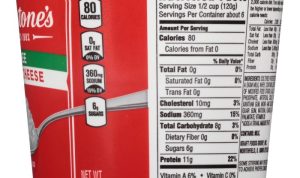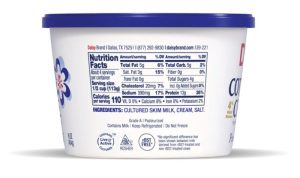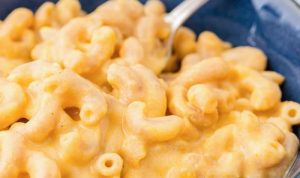Health Implications and Dietary Considerations
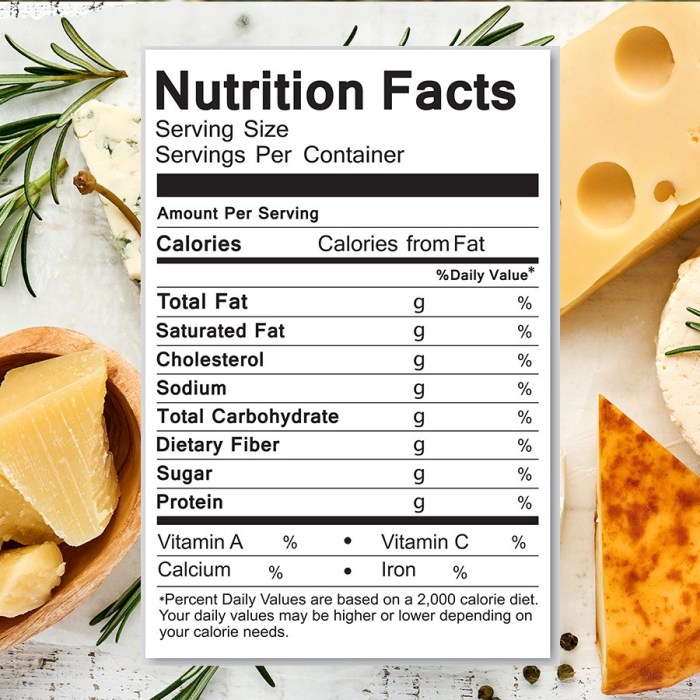
Vegan cheese nutrition label – Vegan cheese, a popular dairy-free alternative, presents a unique nutritional profile compared to its dairy counterpart. Understanding the differences in fat content, sodium levels, and cholesterol is crucial for making informed dietary choices. This section will explore the health implications and dietary considerations associated with regular vegan cheese consumption.
A key difference between vegan and dairy cheese lies in their fat composition. Dairy cheese typically contains a higher proportion of saturated fat, which has been linked to increased cholesterol levels and heart disease risk. Vegan cheeses, depending on their ingredients, often have a higher proportion of unsaturated fats, particularly monounsaturated and polyunsaturated fats, which are considered healthier fats.
However, the specific fat content varies greatly depending on the type of vegan cheese and its ingredients; some vegan cheeses may utilize coconut oil or other oils high in saturated fat. Therefore, checking the nutrition label is crucial for assessing the fat profile of any specific vegan cheese product.
Saturated and Unsaturated Fat Content Comparison
While many vegan cheeses boast lower saturated fat than comparable dairy cheeses, this isn’t universally true. For example, a cheddar-style dairy cheese might contain 8g of saturated fat per 100g, whereas a similar vegan alternative might contain 4g or even less. However, some vegan cheeses utilize coconut oil, resulting in higher saturated fat content than certain dairy cheeses. The unsaturated fat content will also vary; some vegan cheeses utilize oils rich in monounsaturated or polyunsaturated fats, leading to a healthier fat profile.
Always consult the nutrition label to compare the specific fat composition of individual products.
Potential Health Benefits and Drawbacks of Vegan Cheese Consumption
Regular consumption of vegan cheese can offer several potential health benefits. For individuals seeking to reduce their saturated fat intake and cholesterol levels, many vegan cheese options can be a suitable substitute for dairy cheese. Furthermore, some vegan cheeses are fortified with vitamins and minerals, adding nutritional value to the diet. However, drawbacks exist. Many vegan cheeses are high in sodium, which can contribute to high blood pressure if consumed excessively.
Also, the high fat content in some varieties, even if unsaturated, should be considered within the context of an overall healthy diet. Careful selection based on the nutritional label is paramount.
Vegan Cheese and Dietary Plans, Vegan cheese nutrition label
Vegan cheese can be incorporated into various dietary plans with careful consideration of its nutritional profile. For high-protein diets, choosing vegan cheeses made with ingredients like nuts or legumes can increase protein intake. However, for low-sodium diets, selecting brands with lower sodium content is crucial. Individuals following low-fat diets should opt for vegan cheeses with lower overall fat content and a higher proportion of unsaturated fats.
Yo, checking out a vegan cheese nutrition label? It’s all about the macros, right? But sometimes you wanna compare it to the real deal, so peep the nutrition facts ricotta cheese to see the diff. Then you can decide if that vegan cheese is really hitting those nutritional goals, fam. Back to that vegan cheese label – make sure you’re getting your protein and calcium!
The versatility of vegan cheese allows for its inclusion in diverse dietary approaches, provided that the nutritional information is carefully reviewed before purchase and consumption.
Label Reading and Interpretation: Vegan Cheese Nutrition Label
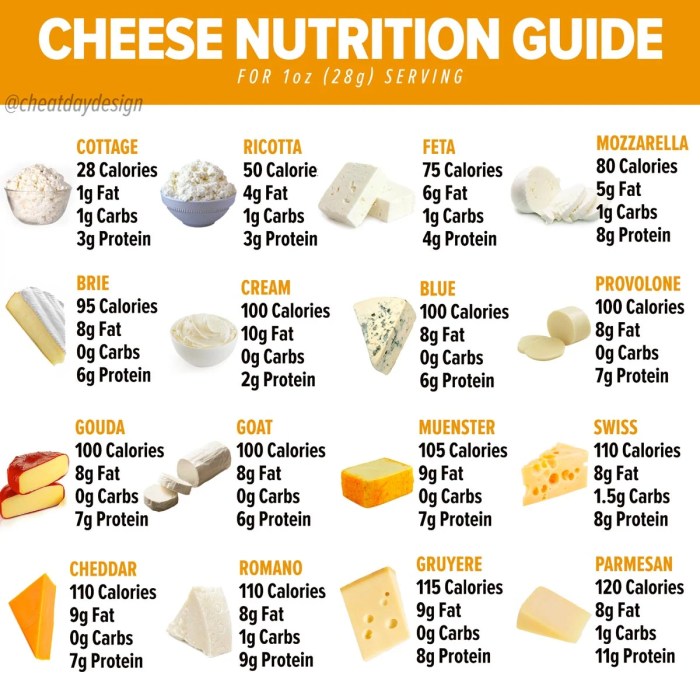
Understanding the nutrition facts panel on your vegan cheese package is crucial for making informed dietary choices. This section will guide you through interpreting the information provided, enabling you to compare different products effectively and choose the option that best suits your needs. We will explore serving sizes, daily values, and key nutritional components like calories, fat, and sodium.
The nutrition facts panel presents a standardized format for displaying nutritional information, making comparisons between different brands and types of vegan cheese straightforward. Let’s delve into the key aspects of label interpretation.
Serving Size and Daily Values
Serving size is the amount of food typically consumed in one sitting, as defined by the manufacturer. It’s the reference point for all the nutritional values listed on the label. For example, a vegan cheese package might list a serving size as 30 grams (approximately one ounce). Daily Values (%DV) are percentages showing how much a nutrient in a serving contributes to a 2,000-calorie diet.
A %DV of 5% or less is considered low, while 20% or more is considered high. By examining the %DV, you can quickly assess whether a serving of vegan cheese provides a significant portion of your daily needs for specific nutrients like fat, sodium, or vitamins.
Identifying Key Nutritional Information
The nutrition facts panel clearly displays key nutritional information, including calories, total fat, saturated fat, trans fat, cholesterol (usually zero in vegan cheese), sodium, total carbohydrate, dietary fiber, total sugars, and protein. For instance, you might see a label indicating 100 calories per serving, 8 grams of total fat, 2 grams of saturated fat, and 200 milligrams of sodium.
These values allow you to compare different vegan cheeses and select one that aligns with your dietary goals and preferences, for example, a lower-sodium option if you are watching your sodium intake.
Comparing Nutritional Information of Different Vegan Cheese Products
Comparing different vegan cheese products is simplified by using the nutrition facts panel. Imagine you are comparing two brands of cheddar-style vegan cheese. Brand A shows 100 calories, 8g fat, and 200mg sodium per serving, while Brand B shows 120 calories, 10g fat, and 250mg sodium per serving. By directly comparing these values, you can easily see that Brand A is lower in calories, fat, and sodium than Brand B.
This straightforward comparison helps you make a healthier choice based on your individual nutritional needs and preferences. You can also compare other nutrients like protein and fiber in a similar manner. Remember to always check the serving size to ensure a fair comparison, as different serving sizes can skew the results.
Question & Answer Hub
What are the best vegan cheese brands for B12?
Many brands fortify their vegan cheese with vitamin B12, but always check the nutrition label as content varies. Look for brands that specifically highlight B12 fortification.
Is vegan cheese good for weight loss?
It depends on the type and serving size. Some vegan cheeses are lower in calories and fat than others. Moderation is key.
Does vegan cheese contain gluten?
Not always. Many vegan cheeses are gluten-free, but always check the ingredient list as some may contain gluten-containing ingredients.
How does the sodium content of vegan cheese compare to dairy cheese?
Sodium content can vary widely among both vegan and dairy cheeses. Always check the nutrition label for specific sodium amounts and choose lower sodium options.


